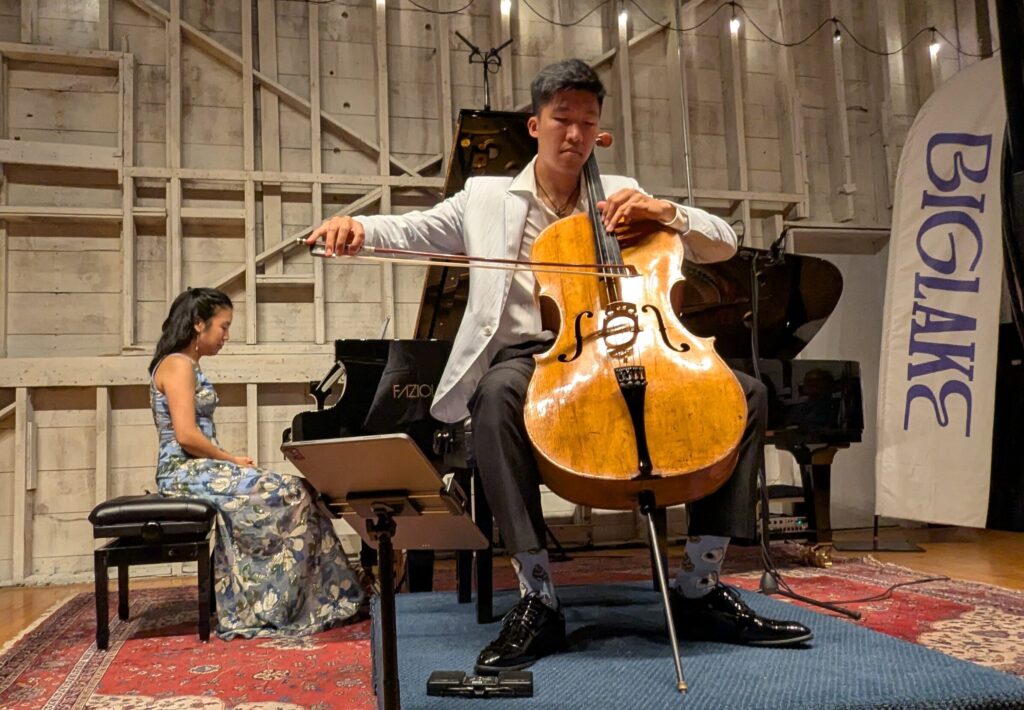 Silvie and Bryan Cheng at Wellington Music Hall (Photo: Chris Fanning)
Silvie and Bryan Cheng at Wellington Music Hall (Photo: Chris Fanning)
Last night’s BIGLAKE concert at Wellington Music Hall almost didn’t happen.
As a result of complications from the Air Canada strike, the show was delayed an hour and a half. But those ninety minutes do not reflect what had to happen to deliver one of the two performers to the stage.
Cellist Bryan Cheng told the audience that he had been on the road for forty-eight hours. “I went through four different states in the past two days and three cities — none of which was planned for.
“I think I woke up at 4:15 this morning in Omaha, Nebraska.”
Two flights later, and after a seven-hour drive from Detroit, he was seated in front of a full house in Wellington, holding a 1696 Stradivarius cello and ready to play. “With my sort-of young body, I can still take it,” he said with good humour.
The other half of the duo was his sister, pianist Silvie Cheng. She said that the circumstances meant that the music would have a special feel. “Today feels like the biggest ‘trust exercise’ as siblings, because we haven’t played a single note together. This program did not rehearse today.
“Hopefully you can’t tell,” she laughed. “We did last play together five weeks ago, so it feels both familiar and fresh.”
Professionally known as the Cheng² Duo, these musicians share a lifetime of playing together. All who saw them two years ago at Picton’s St. Mary Magdalene had their justly high expectations amply met in Wellington.
Mr. Cheng’s cello filled the music hall with sounds sometimes soft, sometimes gruff. From the bottom of the instrument’s register to the very highest harmonics, this musician has perfect technical control, and great musicality.

The program was firmly modern. Debussy’s cello sonata of 1915 presents great shifts in mood, ranging from delicate impressionist chords in the piano accompaniment to aggressive jagged notes.
Ravel’s 1897 “Sonate Posthume,” originally for violin, gave context to the Debussy.
French modernist sonorities gave way to different national inflections, which also brought different demands on the cellist. Both Manuel de Falla’s “Canciones Populares Españolas” and Sulkan Tsintsadze’s “Pieces on Folk Themes,” offer classical music settings of “non-classical” materials, and we heard Mr. Cheng slapping the body of his instrument to imitate Spanish castanets, or vigorously strumming its strings to create the sound of a Georgian choghur — a variety of lute.
The pièce de résistance was the epic cello sonata of Dimitri Shostakovich, from 1934, fraught with the composer’s experience with Stalinist repression. The performers discussed the piece in advance, demonstrating a motif that represented the sound of the KGB coming up the stairs. The piece ranges through heartfelt melodies and dark ironic passages, as well as frenetic dances. The range of technical abilities required of the cellist is remarkable.
That Bryan Cheng could deliver a stunningly energetic performance is also remarkable. It demonstrated commitment to the music, and to the festival at which he performed it. The standing ovation that expressed gratitude for such commitment was laced with encouragements to go to bed!
We hope he rested well.
The BIGLAKE Festival continues through Saturday. Mr. Cheng will perform again in different ensembles at the gala concert at the Eddie on Friday and in Sunday’s closing show at the Wellington Music Hall.
Tickets here.
See it in the newspaper